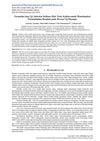Nanoparticles with caffeine can be used for slow, continuous hair growth stimulation.

Caffeine in Alpecin shampoo may help prolong hair root activity and reduce hair loss.
[object Object] December 2022 in “Clinical and experimental dermatology and therapies” Adding the topical gel improved hair growth more than using minoxidil or finasteride alone.

Caffeine can potentially treat common hair loss by counteracting hair follicle shrinkage caused by hormones.
The caffeine shampoo for hair loss is stable and suitable for use.
 November 2013 in “Journal of Mazandaran University of Medical Sciences”
November 2013 in “Journal of Mazandaran University of Medical Sciences” Minoxidil with caffeine works better for hair loss than minoxidil alone.
5 citations,
October 2020 in “Giornale italiano di dermatologia e venereologia” The phyto-caffeine shampoo reduced hair loss and improved hair strength in women with hair thinning.
 94 citations,
May 2011 in “BJCP. British journal of clinical pharmacology/British journal of clinical pharmacology”
94 citations,
May 2011 in “BJCP. British journal of clinical pharmacology/British journal of clinical pharmacology” Hair follicles greatly increase caffeine absorption through the skin shortly after it's applied.
 61 citations,
May 2014 in “International journal of pharmaceutics”
61 citations,
May 2014 in “International journal of pharmaceutics” Nanocrystals improve skin penetration and stability of caffeine, suggesting a new method for delivering similar substances through the skin.
 42 citations,
July 2014 in “European journal of pharmaceutics and biopharmaceutics”
42 citations,
July 2014 in “European journal of pharmaceutics and biopharmaceutics” Caffeine nanocrystals for skin products stay stable with the right stabilizer, but grow in size at higher temperatures.
 29 citations,
December 2011 in “British Journal of Dermatology”
29 citations,
December 2011 in “British Journal of Dermatology” A new hair treatment with caffeine and other ingredients makes hair thicker and less likely to break.
 9 citations,
July 2014 in “PubMed”
9 citations,
July 2014 in “PubMed” The review doesn't clearly say if biotin, caffeine, melatonin, a marine extract, and zinc are effective for treating hair loss.
 3 citations,
April 2019 in “Journal of Dermatological Treatment”
3 citations,
April 2019 in “Journal of Dermatological Treatment” Caffeine shows promise for treating some types of hair loss, but more research is needed.
 3 citations,
January 2018 in “International Journal of Cosmetic Science”
3 citations,
January 2018 in “International Journal of Cosmetic Science” Hair stiffness increased by 13.2% after caffeine treatment, validating the Stiffness-Angle Law as an effective measurement method.
 2 citations,
January 2022 in “Dermatologic Therapy”
2 citations,
January 2022 in “Dermatologic Therapy” Natural products like saw palmetto, caffeine, melatonin, marine extracts, rosemary oil, procyanidin, pumpkin seed oil, and cannabidiol oil could potentially treat male hair loss.
2 citations,
January 2014 Improved methods create smaller, more effective gelatin nanoparticles for skin delivery, and new caffeine nanocrystals enhance absorption and effectiveness.
 1 citations,
January 2019 in “Advances in Medical Sciences”
1 citations,
January 2019 in “Advances in Medical Sciences” The combination of azelaic acid, minoxidil, and caffeine significantly increased the survival of skin flaps by affecting certain body channels and nitric oxide levels.
 November 2023 in “Hair transplant forum international”
November 2023 in “Hair transplant forum international” Caffeine can stimulate hair growth, but the best dose and frequency for hair loss treatment are still unknown.
 June 2023 in “Journal of Pharmaceutical and Health Research”
June 2023 in “Journal of Pharmaceutical and Health Research” Caffeine hair tonic with 0.001% concentration was more effective in promoting hair growth on guinea pigs.
Caffeine in cosmetics has antioxidant effects, protects against UV, reduces cellulite, and stimulates hair growth.
 61 citations,
January 2018 in “Cosmetics”
61 citations,
January 2018 in “Cosmetics” Coffee silverskin may be a beneficial and safe ingredient for cosmetics, offering hydration, firmness, and potential hair growth benefits.
 40 citations,
August 2018 in “Skin appendage disorders”
40 citations,
August 2018 in “Skin appendage disorders” Some alternative treatments for hair loss might work, but more research is needed.
 24 citations,
January 2020 in “International Journal of Molecular Sciences”
24 citations,
January 2020 in “International Journal of Molecular Sciences” Some plants with flavonoids may help treat hair loss and promote hair growth.
12 citations,
March 2012 in “ATLA. Alternatives to laboratory animals” Hair follicles significantly affect the skin absorption of some drugs.
 8 citations,
June 2022 in “Cosmetics”
8 citations,
June 2022 in “Cosmetics” Coffee berry extract may help slow skin aging and prevent hair loss.
 7 citations,
February 2018 in “International Journal of Pharmaceutics”
7 citations,
February 2018 in “International Journal of Pharmaceutics” Researchers developed a method to measure drugs in hair follicles and found that both water-loving and fat-loving drugs can be detected after being applied to the skin.
[object Object] 6 citations,
August 2021 in “International Journal of Cosmetic Science” Using antioxidants on the scalp can make it healthier and decrease hair loss.
 3 citations,
January 2023 in “International Journal of Cosmetic Science”
3 citations,
January 2023 in “International Journal of Cosmetic Science” Coffee and its by-products are promising for skin health benefits in cosmetics and help reduce environmental impact.
2 citations,
January 2016 Optimized formulations with specific ingredients can significantly improve skin delivery of topical drugs.



















